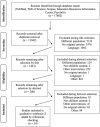Does Learning Through Movement Improve Academic Performance in Primary Schoolchildren? A Systematic Review
- PMID: 35345611
- PMCID: PMC8957225
- DOI: 10.3389/fped.2022.841582
Does Learning Through Movement Improve Academic Performance in Primary Schoolchildren? A Systematic Review
Abstract
Physically active children have greater motor competence and a faster maturation compared with their sedentary peers. Recent research also suggests that physical activity during childhood may also promote cognitive development and therefore improve academic performance. The aim of this study was to understand if physically active academic lessons may improve academic achievement in primary schoolchildren. A systematic review following the PRISMA (Preferred Reporting Items for Systematic Reviews and Meta-Analyses) guidelines was conducted. The search was performed on the following database: PubMed, Web of Science, Scopus, Education Resources Information Center (ERIC), and PsycINFO (APA). Studies evaluating schoolchildren aged between 3 and 11 years taking part in educational contexts that include physical activity and natural environments evaluating physical fitness and/or educational outcomes were included. A total of 54 studies (for a total sample of 29,460 schoolchildren) were considered eligible and included in the qualitative synthesis. The Effective Public Health Practice Project risk-of-bias assessment revealed a moderate quality of the included studies with only two considered weeks. Despite differences in the retrieved protocols, physically active academic lessons improve the total time engaged in physical activity, motor skills, and/or academic performance. The results of this review suggest that learning through movement is an effective, low-cost, and enjoyable strategy for elementary schoolchildren.
Keywords: academic achievement; infant; kindergarten; nature; outdoor learning; preschool; primary school.
Copyright © 2022 Petrigna, Thomas, Brusa, Rizzo, Scardina, Galassi, Lo Verde, Caramazza and Bellafiore.
Conflict of interest statement
The authors declare that the research was conducted in the absence of any commercial or financial relationships that could be construed as a potential conflict of interest.
Figures
Similar articles
-
Effects of flexible learning spaces, active breaks, and active lessons on sedentary behaviors, physical activity, learning, and musculoskeletal health in school-aged children: a scoping review.J Act Sedentary Sleep Behav. 2024 Dec 2;3(1):30. doi: 10.1186/s44167-024-00068-2. J Act Sedentary Sleep Behav. 2024. PMID: 40217446 Free PMC article. Review.
-
The future of Cochrane Neonatal.Early Hum Dev. 2020 Nov;150:105191. doi: 10.1016/j.earlhumdev.2020.105191. Epub 2020 Sep 12. Early Hum Dev. 2020. PMID: 33036834
-
Student and educator experiences of maternal-child simulation-based learning: a systematic review of qualitative evidence protocol.JBI Database System Rev Implement Rep. 2015 Jan;13(1):14-26. doi: 10.11124/jbisrir-2015-1694. JBI Database System Rev Implement Rep. 2015. PMID: 26447004
-
Beyond the black stump: rapid reviews of health research issues affecting regional, rural and remote Australia.Med J Aust. 2020 Dec;213 Suppl 11:S3-S32.e1. doi: 10.5694/mja2.50881. Med J Aust. 2020. PMID: 33314144
-
Cognitive and Academic Outcomes of Fundamental Motor Skill and Physical Activity Interventions Designed for Children with Special Educational Needs: A Systematic Review.Brain Sci. 2022 Jul 28;12(8):1001. doi: 10.3390/brainsci12081001. Brain Sci. 2022. PMID: 36009064 Free PMC article. Review.
Cited by
-
Cardiorespiratory Fitness, Motor Coordination, and Academic Achievement in School Students (11-13 years).Glob Pediatr Health. 2023 Oct 21;10:2333794X231207311. doi: 10.1177/2333794X231207311. eCollection 2023. Glob Pediatr Health. 2023. PMID: 37872961 Free PMC article.
-
Bullying and Cyberbullying Are Associated with Low Levels of Motivational Beliefs Toward Learning in Youth.Eur J Investig Health Psychol Educ. 2025 May 23;15(6):93. doi: 10.3390/ejihpe15060093. Eur J Investig Health Psychol Educ. 2025. PMID: 40558836 Free PMC article.
-
A Multimodal Physical Program Combining Abacus Use and Exercise to Improve Motor Coordination and Flexibility in Primary School Children.J Funct Morphol Kinesiol. 2025 Jul 5;10(3):255. doi: 10.3390/jfmk10030255. J Funct Morphol Kinesiol. 2025. PMID: 40700191 Free PMC article.
-
One Health Education Nexus: enhancing synergy among science-, school-, and teacher education beyond academic silos.Front Public Health. 2024 Mar 22;11:1337748. doi: 10.3389/fpubh.2023.1337748. eCollection 2023. Front Public Health. 2024. PMID: 38585291 Free PMC article.
-
Effects of flexible learning spaces, active breaks, and active lessons on sedentary behaviors, physical activity, learning, and musculoskeletal health in school-aged children: a scoping review.J Act Sedentary Sleep Behav. 2024 Dec 2;3(1):30. doi: 10.1186/s44167-024-00068-2. J Act Sedentary Sleep Behav. 2024. PMID: 40217446 Free PMC article. Review.
References
Publication types
LinkOut - more resources
Full Text Sources


